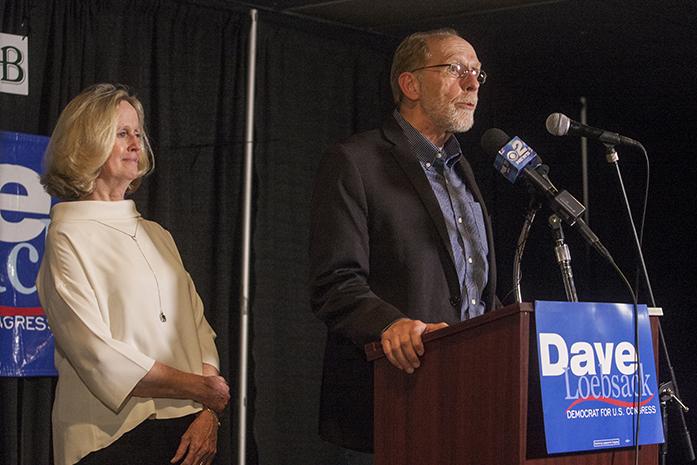By Maria Curi
Marking his sixth term in the U.S. House of Representatives, Rep. Dave Loebsack, D-Iowa, beat his libertarian-minded challenger Christopher Peters in Iowa’s 2nd Congressional District.
At approximately 11:20 p.m. Tuesday, with 76 percent of precincts reporting, Loebsack had received 146,798 votes, good for 54.4 percent of the vote. Peters garnered 123,165 votes, or 45.6 percent of the vote.
These vote tallies are preliminary and will become official pending a canvass.
Speaking to a crowd at the First Avenue Club in Iowa City, Loebsack said in reference to the presidential election and Republican victories across Iowa that it’s “not exactly a happy night.”
“It was a tough night tonight; I want to thank everyone who helped get me here, but the results that we saw tonight in Iowa are unacceptable,” Loebsack said.
Loebsack, 63, a Sioux City native, kicked off his political career in 2006 when — in a major upset — he beat 15-term Republican Rep. Jim Leach. Before becoming a politician, Loebsack was a political-science professor at Cornell College, a small liberal-arts school in eastern Iowa.
From Iowa City, Sharon Thomas, 69, said she is not familiar with Loebsack’s opponent, but that she never wavers from Democrats.
“He [Loebsack] is trustworthy, I trust he’ll do what’s right,” Thomas said.
A veteran, physician, and small-business owner, Peters, 56, said there is a high likelihood that he will run against Loebsack again.
“I definitely want to be involved in policy discussion,” Peters said. “I want to continue to bring civility back into politics.”
University of Iowa junior Marissa Meyer, who attended Peters’ watch party at the Airliner, said Peters should run again.
“If he runs again, it will show that he cares, that he is willing to do whatever it takes,” Meyer said.
Throughout his campaign, Peters proposed congressional term limits and vowed to serve no more than 10 years if elected. He said although term limits are supposed to happen naturally through competitive elections, generally the monetary influence of special interest groups gives incumbents an unfair advantage.
Rod Sullivan, the chairman of the Johnson County Board of Supervisors said that he is in favor of term limits, but that it doesn’t always give unfair advantages and pointed to 2006, when Loebsack, who had little name recognition, beat Leach.
“Dave grew up poor,” Sullivan said. “He knows the struggle some Iowans are going through and that’s why he’s good for the state.”
According to Open Secrets, Loebsack’s No. 1 contributor between 2015 and 2016 was not a special-interest group but individuals associated with the University of Iowa — $28,185. The following top four contributors to Loebsack’s campaign were special-interest groups, including $15,000 from the American Federation of State, County and Municipal Employees, $15,000 from Aegon NV, $15,00 from the American Bankers Association, and $15,000 from the American Dental Association.
In his fifth term, Loebsack worked on the Energy & Commerce Committee, where he helped pass the bipartisan Rural Spectrum Accessibility Act that led to the expansion of broadband and internet accessibility in rural areas in Iowa.
In his sixth term, Loebsack said, he will continue to work on infrastructure and education.
“‘Eighteen’ is going to be very important,” Loebsack said. “We need to get this state back on the right foot.”



